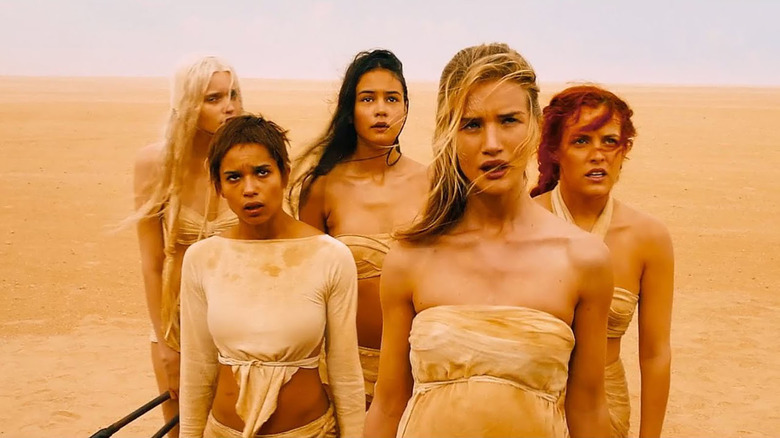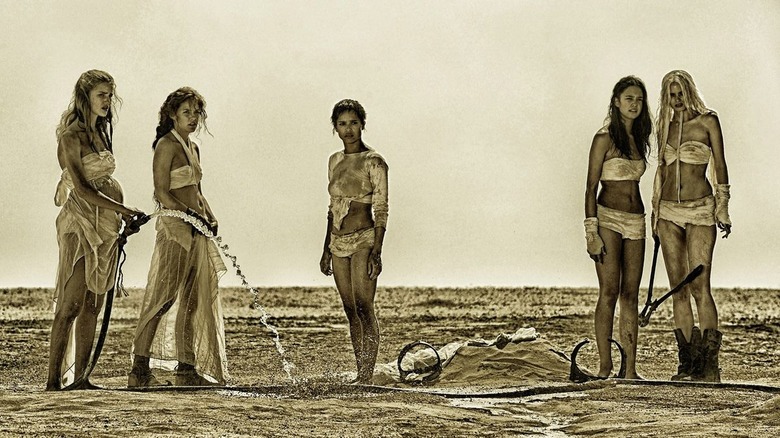How Mad Max: Fury Road Tried To Do Its Most Vulnerable Characters Justice
George Miller's "Mad Max: Fury Road" is considered to be one of the greatest post-apocalyptic action films of all time, building on the 1979 original and its sequels to create an absolute masterpiece. With resources scare and the tyrannical slaver Immortan Joe (Hugh Keays-Byrne) ruling the wasteland with a brainwashed army of War Boys, titular hero Max Rockatansky is captured and brought to Immortan Joe's Citadel to be harvested as a "blood bag" for an ill War Boy. While captured, the warrior Imperator Furiosa (Charlize Theron) leads an escape for the five enslaved "wives" of Immortan Joe. Joe sends his War Boys (with Max in tow) out on a mission to bring them back. In the midst of the ensuing high-speed chase through the Wasteland, Max and Furiosa forge an alliance, and do their best to survive the ruthless warlord and his army of henchmen.
Water and gasoline are considered the two most valuable resources in the world of "Fury Road," but what Immortan Joe values most is the accessibility of women. In most post-apocalyptic stories, those assigned female at birth are frequently treated as currency. In "28 Days Later," Major Henry West says the quiet part out loud — "Women mean a future." Immortan Joe doesn't treat his wives as loving partners, but as cattle for breeding, and bodies from which he can extract his own pleasure. Playing these women was no easy task for Rosie Huntington-Whiteley, Riley Keough, Zoe Kravitz, Abbey Lee, and Courtney Eaton, but Miller called in an expert to ensure these women were being presented authentically.
Miller valued the experiences of The Wives
Via a New York Times oral history (and the book "Blood, Sweat, and Chrome" by Kyle Buchanan), George Miller invited "The Vagina Monologues" playwright and gender activist Eve Ensler to speak with the young performers, as a means to help them better understand their characters. Ensler has a history of assisting Congolese survivors of gender-based violence, and Miller involved Ensler as a consultant as he was writing the script. Ensler was later invited to Namibia where the film was shot to conduct workshops with the women, and empower them to have the confidence to play the roles with authenticity.
"Even if a lot of the women's history wasn't in the dialogue, it was really important to George that we understood what we were running from," said Zoe Kravitz. Rosie Huntington-Whiteley agreed, saying "the workshopping process was really emotional. Having grown up with a very pleasant childhood in a middle-class family in the U.K., it was a big shock to the system."
Ensler tasked the women with exercises like writing letters in-character to Immortan Joe, a way to solidify the emotional grounding of the characters and help build a sense of empathy for their endurance. "I'm glad we had that, because it was such a crazy experience — so long and chaotic — that it would be easy to forget what we were doing if we didn't have this really great foundation that we could return to," said Kravitz. "I thought it was amazing that George cared so much," said Riley Keough. "It could have just been like, "'This is a big Hollywood movie, now put on your bathing suits and get outside.'"
This attention to sensitivity should be the standard for all Hollywood pictures, but until then, it's important to celebrate the standards set by people like Miller.

